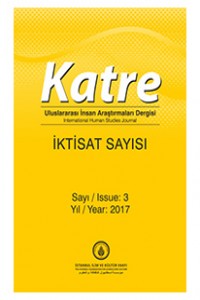Abstract
‘Human Rationality’, a very important assumption in many social sciences, requires at the least, consistent behavior which is in line with logical reasoning or behaviour simply defined as “acting while using intellect”. Scientific studies also show that humans do not behave in a rational way.
Some examples of human behavior which do not overlap with rationality are the following:
(1) Framing Effect: This is a case where the same two options can be worded differently leading to changes in their relative attractiveness;
(2) Decoy Effect: which means that people’s preference for one option over another changes as a result of adding a third bad option;
(3) Certainty Effect: which implies people are willing to forgo some amount for certainty;
(4) Loss Aversion: which implies that the displeasure associated with loss is much larger than pleasure associated with the same amount of gain.
Keywords
References
- iktisat risalesi
Abstract
Sosyal bilimlerin birçok dalı için önemli bir varsayım olan ‘rasyonel insanın’ en azından tutarlı olması ve mantık ilkelerine aykırı hareket etmemesi basitçe aklını kullanarak hareket etmesi beklenmektedir. Son yıllarda yapılan çalışmalar, insanların çoğunlukla rasyonel davranmadığını göstermektedir. İnsan davranışlarının rasyonellikle örtüşmeyen sapmalarına örnek olarak; (1) ‘çerçeve etkisi’, (2) ‘tuzak etkisi’, (3) ‘kesinlik etkisi’ ve (4) ‘zarardan kaçınma’ verilebilir. Bu gelişmeler ışığında aklın insan mahiyetinde nereye oturması gerektiğine cevap aramak için insanı hem maddi hem manevi yönüyle bütüncül olarak değerlendirdiğinden dolayı, dini kaynaklara yönelinmiştir. Bu çalışmada, aklın mahiyetini, çalışma düsturlarını, çıktılarını ve aklı devre dışı bırakan durumları Risale-i Nur’dan incelenmektedir. Risale-i Nur’a göre insanın en kıymettar cihazı olan aklın görevi zahiri hasselerden giren verileri birleştirmek veya ayrıştırmak yani ölçüp, biçip tartmaktır. Bu ölçümleri yaparken geçmiş ve gelecek ile de alakadardır oradan bilgi toplar. Risale-i Nur’da ele alınan bir diğer önemli husus aklın bazı durumlarda maddi ve manevi sarhoş edicilerin veya hislerin baskın gelmesiyle devre dışı kalmasıdır. Kısacası, Risale-i Nur’a göre insan her zaman rasyonel değildir. Bunun da en aşikâr göstergesi, kişinin Allah’a ve ahirete iman ettiği halde aklının rağmına olarak büyük günahlara düşebilmesidir.
Keywords
References
- iktisat risalesi
Details
| Primary Language | Turkish |
|---|---|
| Subjects | Religious Studies |
| Journal Section | Refereed Articles |
| Authors | |
| Publication Date | June 1, 2017 |
| Submission Date | June 1, 2017 |
| Published in Issue | Year 2017 Issue: 3 |

Katre International Human Studies Journal is open access journal under the CC BY-NC license (Creative Commons Attribution 4.0 International License)
Based on a work at https://dergipark.org.tr/en/pub/katre
E-mail: katre@iikv.org


